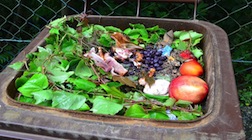I'm dutifully throwing my coffee grounds, eggshells, and banana peels in my compost heap, but my pile is seriously underperforming. This fall, my dirt wasn't dark and rich and wormy; instead, it just looked dry and unhealthy. Then winter came, bringing freezing temperatures that made turning the dirt even more difficult and bringing groans from my children, who didn't want to bundle up just to throw a bucket of vegetable skins in the compost pile. This made me ponder: how does one maintain a healthy compost bin in the colder months, and just as important, how can one motivate children to contribute to composting, even when hat and gloves are required?
Amanda Fuller, operations manager at Breaking New Grounds, the five year-old brainchild of then-Heine Brothers’ Coffee co-owners Gary Heine and Mike Mays, was quick to troubleshoot my winter composting conundrum. She said the two most common reasons at-home compost bins or piles underperform are a lack of carbon-rich materials and inadequate moisture. (And she should know: Breaking New Grounds uses Heine’s coffee grounds, Brown Forman’s brewery grains, and Limbwalker Tree Service’s wood chips to create more than two tons of excellent vermicompost each year at their West End urban garden.)
I'm not aiming to create that much boutique-quality dirt, but come Spring, I'd like a decent pile of healthy dirt to add to my new potted flowers and sprouting vegetable garden. So I need more carbon; that is, more leaves, wood shavings, or shredded newspaper. Fuller recommends that these carbon-rich materials make up about half of your compost pile. (Oops! Besides some crunchy leaves left over from Fall, I don't have any carbon, and definitely not fifty percent.) And tearing newspapers into long strips--indoors--sounds like a job I can easily pass off as fun to my little ones, and they'll still be helping to maintain our family compost heap.
It's also important to keep your dirt moist, and if your compost cooks in a closed container, it's more common for it to dry out. So when you're dumping your kitchen scraps into the bin, have the kids help rinse out the bucket and add that water to your compost as well.
Some other dos and don'ts: Do keep layering your kitchen waste with carbon-rich materials, trying to keep the vegetable peels and trimmings in the center of the bin or pile, so that your compost will "cook" over the course of a few months. Don't add oily, greasy, or fatty kitchen scraps (no salad dressings, cheese, or meat, for example). Do turn your compost, allowing for air movement. Don't add ashes from your fireplace; besides potentially causing a fire, the high alkaline content in wood ash can wreak havoc on the delicate science experiment that is your compost bin or heap. Do add coffee grounds, tea leaves, worms, or any yard waste like grass, hay, or straw—if it’s "green" and not chemically treated, it's probably safe for your compost. And do find fun ways to get your kids involved; even the smallest children can launch banana peels and apple cores into the pile.
Spring will be here before you know it, and compost piles throughout Louisville will begin breaking down faster and more easily. Your kids' interest in making rich dirt will also increase as soon as you break out the mini-sized gloves and spades to plant that first flower. And by following Fuller's recommendations to maintaining a healthy compost pile in the winter, you're certain to see some happy worms crawling through your dirt this Spring, and that will certainly delight your little gardeners. After all, playing in the dirt is one of the best perks of childhood, and for parents, composting is a perfect activity—it's free, fun, functional, and educational.
Springtime will also bring some compost sales and workshops hosted by Breaking New Grounds. Check the website for more information and to learn how this community-based food network is growing Louisville's economy as well as helping the environment. And if you'd like to volunteer or buy compost from Breaking New Grounds, contact Fuller at 502-356-2216 or Amanda@breakingnewgrounds.org. Smaller quantities of the "Life’s Magic" vermicompost are available for purchase at area Heine Brothers’ Coffee locations.
Also, check out the city's informational page on composting: http://www.louisvilleky.gov/SolidWaste/IWantTo/Start+Composting.htm
Happy composting!
Photo: courtesy of Shutterstock.com



